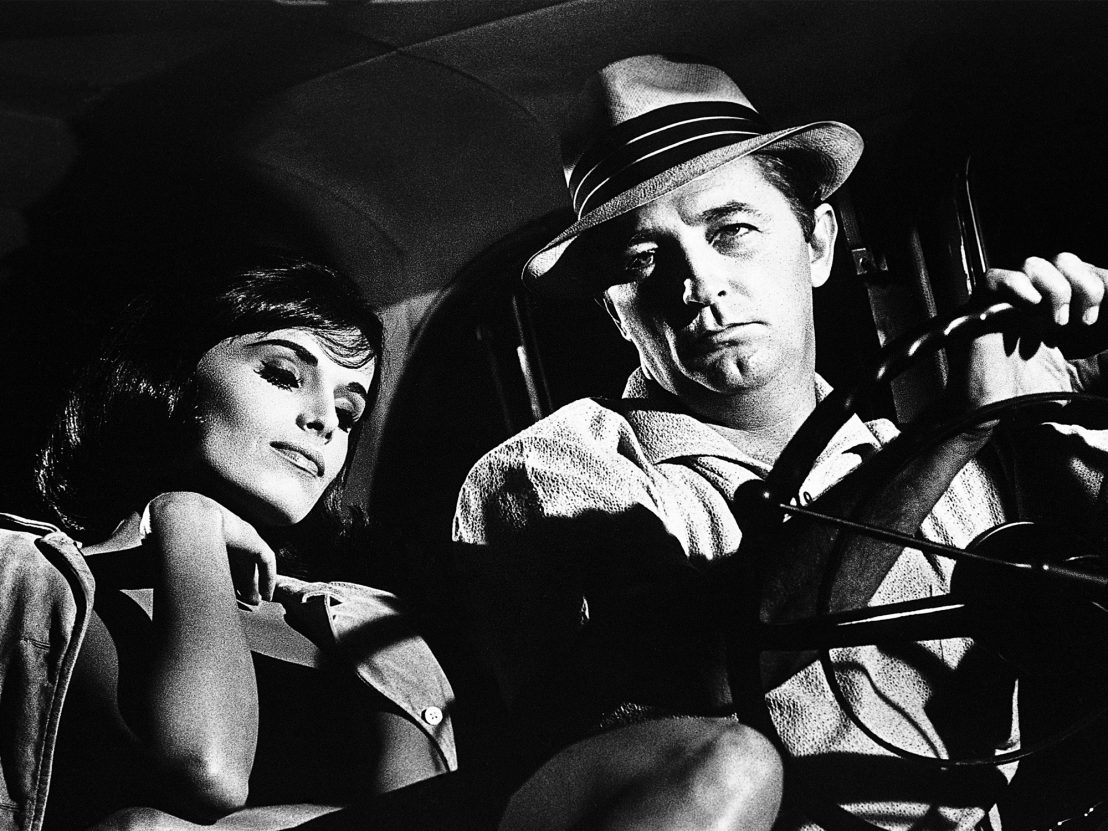
“He was always ready to explode” was director J Lee Thompson’s description of Robert Mitchum’s acting when working with him on their brutal 1962 noir Cape Fear. Though the actor already had a track record for playing tough guys, even the most ardent Mitchum fan would have been unprepared for the maliciousness of this role.
Adapted from John D McDonald’s novel ‘The Executioners’, Cape Fear is a revenge tale told with a uniquely evil emphasis. It follows Sam Bowden (Gregory Peck, also the film’s producer), a small-town lawyer who lives an idyllic life with his wife Peggy (Polly Bergen) and his daughter Nancy (Lori Martin). Eight years before, Sam testified as a citizen against Max Cady (Mitchum), a vicious serial rapist.
On his release, Cady tracks down the Bowden family and begins to menace them. In spite of attempts to run him out of town, Cady is a clever adversary; he knows the law and how far he can push it. More than merely menacing the Bowdens, however, Cady wants his revenge to be as scarring as possible; he tells Sam that his ultimate aim is to rape his wife and daughter. Just how far will Sam go in order to protect his family from such a fate?
For a film made in the early 1960s, Cape Fear pulls no punches in regards to its subject matter. Its heady, sleazy atmosphere lingers long after viewing. Though this is down to Lee’s direction and the sweltering Southern Georgia setting as much as anything else, the real heart of the film’s menace is in Mitchum’s performance.
The actor’s louche swagger is the first thing the viewer sees – as the opening credits roll, he strolls casually along in his linen jacket and Panama hat. Two things tell the viewer this is ominous; the first is Bernhard Herrmann’s music, a leitmotif for Mitchum’s character that renders even his presence on the sidewalk a potential threat. The second is Mitchum himself – he looks normal at first, but as he encounters people his detached demeanour becomes apparent.
He stares at a woman in the street, the leer never better in Mitchum’s career. Another woman drops some files in front of him. Instead of helping her, he just walks on. It’s a simple scenario and yet Mitchum’s movements suggest it to be more than a lazy lack of regard for others. Women only concern Cady in one way. He hates the society around him; the bitterness may partly be real, in that the filming location of Savannah was where Mitchum was put to work in a chain gang for vagrancy when younger.
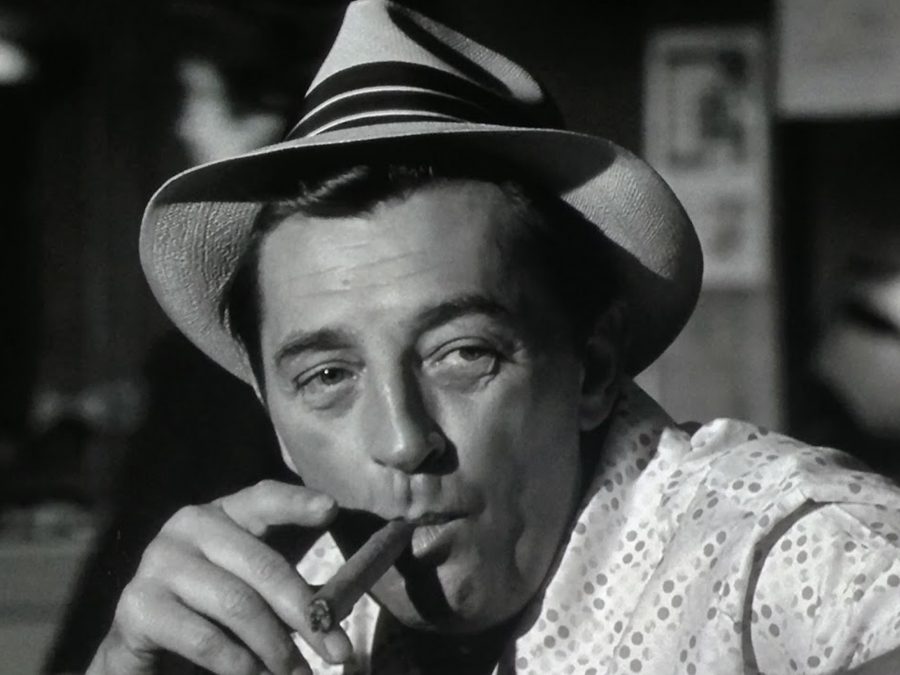
Mitchum had already created another great noir villain in the period; the preacher in Charles Laughton’s The Night of the Hunter. Similar to Cady, Reverend Harry Powell is a misogynist but manifests on-screen very differently. Their drives are the same, combining a deadly mixture of lust and loathing. Yet the way they operate results in dramatically contrasting performances, showing the full range of Mitchum’s skill. There’s a reason why Cady was voted the 28th best villain in the American Film Institute’s 2003 Heroes & Villains poll while Powell came 29th.
On one hand, Powell has built a narrative around him to excuse his attacks on women for their money. It was done in God’s name, legitimised by his own demented theology – Cady is a different affair entirely. He doesn’t need any frame of reference to live with what he does because he doesn’t care. He enjoys sexual violence against women in the same way he enjoys whiskey and the ubiquitous cigar clenched between his teeth.
The symbolic fire and thunder of Laughton’s film is replaced with sweaty innuendo in Lee’s, a change exemplified in Mitchum. His body glistens on screen, becoming animal-like in the film’s breath-taking final 20 minutes. According to biographer Lee Server, Mitchum would wander the set topless throughout filming, working up rages and even avoiding niceties with the crew.
Cady becomes a creature crawling through the swamp, but the point overall of Thompson’s film is that this is, in another sense, extremely ordinary. Reality is replete with Max Cadys. He’s not some mythical preacher extolling Love and Hate; he’s an everyman, the guy at the bar with the lingering stare.
Even Cady’s on-screen opposite has a difficult time squaring up to him. Peck famously was a little put down by Mitchum’s performance, largely because it stole the limelight. As Thompson suggested in a documentary on the film, “we were always conscious of the fact that Peck’s part was in danger of becoming subsidiary to the villain.”
Such was the momentum of the performance, Mitchum seemed unstoppable, even for the director. It’s surprising he threw himself in so deeply considering it took Lee and Peck delivering the actor a case of bourbon and flowers to convince him to take the role. In the film’s tensest sequences this momentum comes to the fore.
When finally cornering Peggy on a boat, it seems that Cady will indeed get his revenge and assault Sam’s wife. The scene is slow and harrowing, Cady trapping Peggy with his huge, soaking body. The sequence was largely improvised, showing the skill of both actors, but Mitchum in particular. His movements are jagged and wild, the real character revealed underneath the initial swagger of earlier. He bursts through doors; genuinely so, as the prop men forgot to unlock them. He’s drawing on real strength and the adrenaline shows.
Mitchum cut himself badly filming this sequence but carried on regardless. The blood seen is real, as was Bergen’s reaction to Mitchum’s taunting her with eggs, again unscripted. It’s one of the most powerful sequences Hollywood ever filmed. As Bergen later recalled, “his hand was covered in blood, my back was covered in blood. We just kept going, caught up in the scene. They came over and physically stopped us.” For a moment, Mitchum was more character than actor – the results are still terrifying today, even sixty years on.
Published 12 Apr 2022
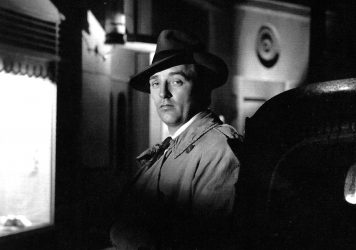
We tip our trilby to the legendary performer who epitomised Hollywood’s most iconic era.
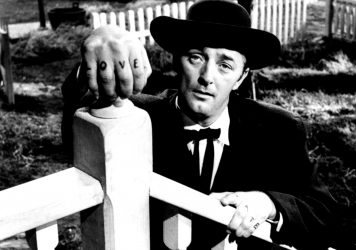
By Mark Asch
One of classic cinema’s great, uncategorisable outliers returns triumphantly to the big screen.
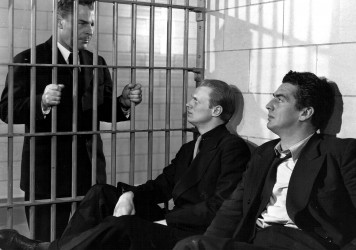
By David Hayles
In 1947’s Kiss of Death, Richard Widmark plays a murderous Joker-styled sociopath.